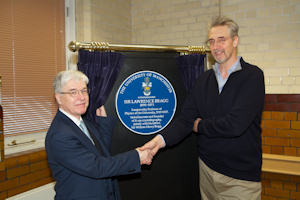University unveils plaque in honour of Nobel Prizewinner Sir Lawrence Bragg
11 Dec 2015
Fellow Nobel Prizewinner and Langworthy Chair Sir Kostya Novoselov gives inaugural annual lecture in his honour

The University has unveiled a plaque in honour of Nobel Prizewinner Sir Lawrence Bragg, one hundred years to the day he should have received the Nobel Prize for Physics (Thursday, 10 December). It wasn’t until September 1922 that Lawrence was officially awarded the prize, due to World War I.
Sir Lawrence and his father, Sir William Bragg, were jointly awarded the Nobel Prize in Physics for their analysis of crystal structure by means of X-rays. Aged twenty-five at the time, Lawrence Bragg remains the youngest ever Nobel Laureate in Physics.
They showed, first, that the phenomenon can be simply understood in terms of the reflection of X-ray waves by planes of atoms in the crystals (according to Bragg's law) and, second, that the observed effects are capable of revealing the detailed arrangements of the atoms in the crystals.
This opened the way to the detailed study of the wave nature of X-rays and began the X-ray analysis of crystal structures that has since revealed the arrangement of the atoms in all kinds of substances from the chemical elements to viruses.
Sir Lawrence did that work before he came to Manchester, but he started at Manchester in 1919 as the Langworthy Chair.
The plaque was unveiled by William Heath, one of Sir Lawrence’s grandchildren, watched by several members of the family and University staff and students.
At an afternoon event, Sir Lawrence’s oldest grandson Nigel Bragg shared some personal recollections before fellow Nobel Prizewinner and Langworthy Chair, Sir Kostya Novoselov, delivered the inaugural Sir Lawrence Bragg Lecture.
Head of the School of Physics and Astronomy, Professor Steve Watts said: “During his time at the University and throughout his career, Sir Lawrence made an astonishing contribution to science. His legacy to our world lives on.
“But he was more than a great mind. He made a difference to many lives through his teaching, mentoring and support for research and his own recently published thoughts on his life and career reveal his other roles as a husband, father and friend.”
To learn more about the University’s history and heritage or book on a free heritage tour, visit:
